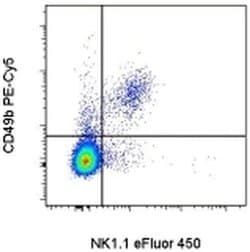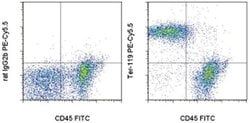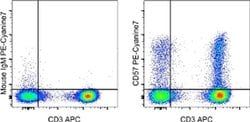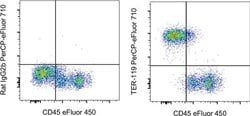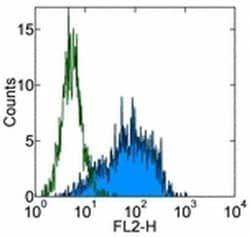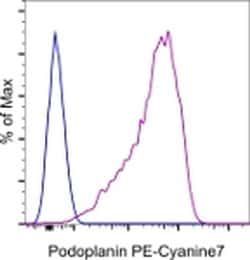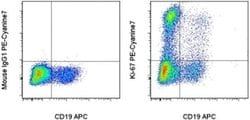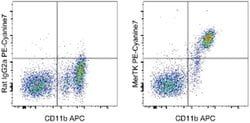50-112-3379
Podoplanin Monoclonal Antibody (eBio8.1.1 (8.1.1)), PE-Cyanine7, eBioscience™, Invitrogen™
Manufacturer: Invitrogen
Select a Size
| Pack Size | SKU | Availability | Price |
|---|---|---|---|
| Each of 1 | 50-112-3379-Each-of-1 | In Stock | ₹ 33,731.00 |
50-112-3379 - Each of 1
In Stock
Quantity
1
Base Price: ₹ 33,731.00
GST (18%): ₹ 6,071.58
Total Price: ₹ 39,802.58
Antigen
Podoplanin
Classification
Monoclonal
Concentration
0.2 mg/mL
Formulation
PBS with 0.1% gelatin and 0.09% sodium azide; pH 7.2
Gene Accession No.
Q62011
Gene Symbols
Pdpn
Purification Method
Affinity chromatography
Regulatory Status
RUO
Gene ID (Entrez)
14726
Content And Storage
4° C, store in dark, DO NOT FREEZE!
Form
Liquid
Applications
Flow Cytometry
Clone
eBio8.1.1 (8.1.1)
Conjugate
PE-Cyanine7
Gene
Pdpn
Gene Alias
CTA-520D8.1, AGGRUS, GP36, GP40, Gp38, HT1A-1, OTS8, PA2.26, T1A, T1A-2
Host Species
Syrian Hamster
Quantity
100 μg
Primary or Secondary
Primary
Target Species
Mouse
Product Type
Antibody
Isotype
IgG
Description
- Description: The 8.1.1 monoclonal antibody reacts with mouse podoplanin (T1a, gp38, aggrus), a 43 kDa transmembrane glycoprotein, named for its expression in kidney glomerular epithelial cells (podocytes)
- In addition, Podoplanin is expressed in epithelial and mesothelial cells such as intestinal epithelium, alveolar type I cells, podocytes, and mesothelium of the visceral peritoneum
- It was also shown to be a potent marker for lymphatic endothelium
- Podoplanin is also expressed by subcapsular epithelial cells of the murine thymus
- Mice deficient in Podoplanin die at birth because of a respiratory defect and congenital lymphedema due to a failure in lymphatic pattern formation
- Applications Reported: This eBio8.1.1 (8.1.1) antibody has been reported for use in flow cytometric analysis
- Applications Tested: This eBio8.1.1 (8.1.1) antibody has been tested by flow cytometric analysis of the TE-71 cell line
- This can be used at less than or equal to 0.125 µg per test
- A test is defined as the amount (µg) of antibody that will stain a cell sample in a final volume of 100 µL
- Cell number should be determined empirically but can range from 10^5 to 10^8 cells/test
- It is recommended that the antibody be carefully titrated for optimal performance in the assay of interest
- Light sensitivity: This tandem dye is sensitive to photo-induced oxidation
- Please protect this vial and stained samples from light
- Fixation: Samples can be stored in IC Fixation Buffer (cat
- 00-8222) (100 µL of cell sample + 100 µL of IC Fixation Buffer) or 1-step Fix/Lyse Solution (cat
- 00-5333) for up to 3 days in the dark at 4°C with minimal impact on brightness and FRET efficiency/compensation
- Some generalizations regarding fluorophore performance after fixation can be made, but clone specific performance should be determined empirically
- Excitation: 488-561 nm; Emission: 775 nm; Laser: Blue Laser, Green Laser, Yellow-Green Laser
- Filtration: 0.2 μm post-manufacturing filtered
- Podoplanin (PDPN, T1A, gp38, Aggrus) is a mucin type-1 glycoprotein with a 40-43 kDa molecular weight
- Podoplanin is expressed in many tumors and normal cells, especially lymphatic epithelial cells and follicular DCs
- Podoplanin localizes in stromal cells of peripheral lymphoid tissue and thymic epithelial cells
- As a regulator of the lymphatic endothelium, podoplanin probably plays a role in maintaining the unique shape of podocytes
- Podoplanin appears to serve as a ligand for CLEC-2 and expression is positively correlated with tumors expressing greater invasive and metastatic potential
- Podoplanin is directly involved in cell migration, aids metastases formation and tumor cell invasion of tissue
- Further, it has also been determined that podoplanin expression is induced through Src activation of Cas and, recently, there are indications of podoplanin presence on Th17 cells
- Initial studies below indicate the presence of podoplanin on a small but distinct population of CD4+ cells from human PBMC
- Dysfunction of the podoplanin protein has been linked to diseases such as lymphangioma and subglottis neoplasm
- Podoplanin has also been proposed as a marker for lung injury due to the physiological function of the protein.
Compare Similar Items
Show Difference
Antigen: Podoplanin
Classification: Monoclonal
Concentration: 0.2 mg/mL
Formulation: PBS with 0.1% gelatin and 0.09% sodium azide; pH 7.2
Gene Accession No.: Q62011
Gene Symbols: Pdpn
Purification Method: Affinity chromatography
Regulatory Status: RUO
Gene ID (Entrez): 14726
Content And Storage: 4° C, store in dark, DO NOT FREEZE!
Form: Liquid
Applications: Flow Cytometry
Clone: eBio8.1.1 (8.1.1)
Conjugate: PE-Cyanine7
Gene: Pdpn
Gene Alias: CTA-520D8.1, AGGRUS, GP36, GP40, Gp38, HT1A-1, OTS8, PA2.26, T1A, T1A-2
Host Species: Syrian Hamster
Quantity: 100 μg
Primary or Secondary: Primary
Target Species: Mouse
Product Type: Antibody
Isotype: IgG
Antigen:
Podoplanin
Classification:
Monoclonal
Concentration:
0.2 mg/mL
Formulation:
PBS with 0.1% gelatin and 0.09% sodium azide; pH 7.2
Gene Accession No.:
Q62011
Gene Symbols:
Pdpn
Purification Method:
Affinity chromatography
Regulatory Status:
RUO
Gene ID (Entrez):
14726
Content And Storage:
4° C, store in dark, DO NOT FREEZE!
Form:
Liquid
Applications:
Flow Cytometry
Clone:
eBio8.1.1 (8.1.1)
Conjugate:
PE-Cyanine7
Gene:
Pdpn
Gene Alias:
CTA-520D8.1, AGGRUS, GP36, GP40, Gp38, HT1A-1, OTS8, PA2.26, T1A, T1A-2
Host Species:
Syrian Hamster
Quantity:
100 μg
Primary or Secondary:
Primary
Target Species:
Mouse
Product Type:
Antibody
Isotype:
IgG
Antigen: Ki-67
Classification: Monoclonal
Concentration: 5 μL/Test
Formulation: PBS with 0.2% BSA and 0.09% sodium azide; pH 7.2
Gene Accession No.: P46013
Gene Symbols: Mki67
Purification Method: Affinity chromatography
Regulatory Status: RUO
Gene ID (Entrez): 100686578, 4288
Content And Storage: 4° C, store in dark, DO NOT FREEZE!
Form: Liquid
Applications: Flow Cytometry
Clone: 20Raj1
Conjugate: PE-Cyanine7
Gene: Mki67
Gene Alias: antigen identified by monoclonal antibody Ki 67; antigen identified by monoclonal antibody Ki-67; Antigen identified by monoclonal antibody Ki-67 homolog; Antigen KI-67; Antigen KI-67 homolog; antigen KI-67; proliferation marker protein Ki-67; antigen KI-67-like; cb31; D630048A14Rik; I79_022666; Ki67; Ki-67; KIA; LOW QUALITY PROTEIN: proliferation marker protein Ki-67; marker of proliferation Ki-67; MIB-; MIB-1; Mki67; PPP1R105; Proliferation marker protein Ki-67; proliferation-related Ki-67 antigen; protein phosphatase 1, regulatory subunit 105; RP11-380J17.2; sb:cb31; si:ch211-250b22.7; unnamed protein product; wu:fa11g09; wu:fb57a07; wu:fi14e05
Host Species: Mouse
Quantity: 100 Tests
Primary or Secondary: Primary
Target Species: Canine, Human
Product Type: Antibody
Isotype: IgG1 κ
Antigen:
Ki-67
Classification:
Monoclonal
Concentration:
5 μL/Test
Formulation:
PBS with 0.2% BSA and 0.09% sodium azide; pH 7.2
Gene Accession No.:
P46013
Gene Symbols:
Mki67
Purification Method:
Affinity chromatography
Regulatory Status:
RUO
Gene ID (Entrez):
100686578, 4288
Content And Storage:
4° C, store in dark, DO NOT FREEZE!
Form:
Liquid
Applications:
Flow Cytometry
Clone:
20Raj1
Conjugate:
PE-Cyanine7
Gene:
Mki67
Gene Alias:
antigen identified by monoclonal antibody Ki 67; antigen identified by monoclonal antibody Ki-67; Antigen identified by monoclonal antibody Ki-67 homolog; Antigen KI-67; Antigen KI-67 homolog; antigen KI-67; proliferation marker protein Ki-67; antigen KI-67-like; cb31; D630048A14Rik; I79_022666; Ki67; Ki-67; KIA; LOW QUALITY PROTEIN: proliferation marker protein Ki-67; marker of proliferation Ki-67; MIB-; MIB-1; Mki67; PPP1R105; Proliferation marker protein Ki-67; proliferation-related Ki-67 antigen; protein phosphatase 1, regulatory subunit 105; RP11-380J17.2; sb:cb31; si:ch211-250b22.7; unnamed protein product; wu:fa11g09; wu:fb57a07; wu:fi14e05
Host Species:
Mouse
Quantity:
100 Tests
Primary or Secondary:
Primary
Target Species:
Canine, Human
Product Type:
Antibody
Isotype:
IgG1 κ
Antigen: MERTK
Classification: Monoclonal
Concentration: 0.2 mg/mL
Formulation: PBS with 0.09% sodium azide; pH 7.2
Gene Accession No.: Q60805
Gene Symbols: Mertk
Purification Method: Affinity chromatography
Regulatory Status: RUO
Gene ID (Entrez): 17289
Content And Storage: 4° C, store in dark, DO NOT FREEZE!
Form: Liquid
Applications: Flow Cytometry
Clone: DS5MMER
Conjugate: PE-Cyanine7
Gene: Mertk
Gene Alias: c-Eyk; c-mer; c-mer proto-oncogene tyrosine kinase; Eyk; MER; MER proto-oncogene, tyrosine kinase; MER receptor tyrosine kinase; MERTK; MGC133349; nmf12; Nyk; Proto-oncogene c-Mer; proto-oncogene tyrosine-protein kinase MER; rdy; receptor tyrosine kinase MerTK; Receptor tyrosine tinase gene probably the gene for Rdy; retinal dystrophy; RP38; sMER; sMERTK; soluble MER; soluble MERTK; STK kinase; Tyro 12; Tyro12; Tyrosine-protein kinase Mer
Host Species: Rat
Quantity: 25 μg
Primary or Secondary: Primary
Target Species: Mouse
Product Type: Antibody
Isotype: IgG2a κ
Antigen:
MERTK
Classification:
Monoclonal
Concentration:
0.2 mg/mL
Formulation:
PBS with 0.09% sodium azide; pH 7.2
Gene Accession No.:
Q60805
Gene Symbols:
Mertk
Purification Method:
Affinity chromatography
Regulatory Status:
RUO
Gene ID (Entrez):
17289
Content And Storage:
4° C, store in dark, DO NOT FREEZE!
Form:
Liquid
Applications:
Flow Cytometry
Clone:
DS5MMER
Conjugate:
PE-Cyanine7
Gene:
Mertk
Gene Alias:
c-Eyk; c-mer; c-mer proto-oncogene tyrosine kinase; Eyk; MER; MER proto-oncogene, tyrosine kinase; MER receptor tyrosine kinase; MERTK; MGC133349; nmf12; Nyk; Proto-oncogene c-Mer; proto-oncogene tyrosine-protein kinase MER; rdy; receptor tyrosine kinase MerTK; Receptor tyrosine tinase gene probably the gene for Rdy; retinal dystrophy; RP38; sMER; sMERTK; soluble MER; soluble MERTK; STK kinase; Tyro 12; Tyro12; Tyrosine-protein kinase Mer
Host Species:
Rat
Quantity:
25 μg
Primary or Secondary:
Primary
Target Species:
Mouse
Product Type:
Antibody
Isotype:
IgG2a κ
Antigen: MERTK
Classification: Monoclonal
Concentration: 0.2 mg/mL
Formulation: PBS with 0.09% sodium azide; pH 7.2
Gene Accession No.: Q60805
Gene Symbols: Mertk
Purification Method: Affinity chromatography
Regulatory Status: RUO
Gene ID (Entrez): 17289
Content And Storage: 4° C, store in dark, DO NOT FREEZE!
Form: Liquid
Applications: Flow Cytometry
Clone: DS5MMER
Conjugate: PE-Cyanine7
Gene: Mertk
Gene Alias: c-Eyk; c-mer; c-mer proto-oncogene tyrosine kinase; Eyk; MER; MER proto-oncogene, tyrosine kinase; MER receptor tyrosine kinase; MERTK; MGC133349; nmf12; Nyk; Proto-oncogene c-Mer; proto-oncogene tyrosine-protein kinase MER; rdy; receptor tyrosine kinase MerTK; Receptor tyrosine tinase gene probably the gene for Rdy; retinal dystrophy; RP38; sMER; sMERTK; soluble MER; soluble MERTK; STK kinase; Tyro 12; Tyro12; Tyrosine-protein kinase Mer
Host Species: Rat
Quantity: 100 μg
Primary or Secondary: Primary
Target Species: Mouse
Product Type: Antibody
Isotype: IgG2a κ
Antigen:
MERTK
Classification:
Monoclonal
Concentration:
0.2 mg/mL
Formulation:
PBS with 0.09% sodium azide; pH 7.2
Gene Accession No.:
Q60805
Gene Symbols:
Mertk
Purification Method:
Affinity chromatography
Regulatory Status:
RUO
Gene ID (Entrez):
17289
Content And Storage:
4° C, store in dark, DO NOT FREEZE!
Form:
Liquid
Applications:
Flow Cytometry
Clone:
DS5MMER
Conjugate:
PE-Cyanine7
Gene:
Mertk
Gene Alias:
c-Eyk; c-mer; c-mer proto-oncogene tyrosine kinase; Eyk; MER; MER proto-oncogene, tyrosine kinase; MER receptor tyrosine kinase; MERTK; MGC133349; nmf12; Nyk; Proto-oncogene c-Mer; proto-oncogene tyrosine-protein kinase MER; rdy; receptor tyrosine kinase MerTK; Receptor tyrosine tinase gene probably the gene for Rdy; retinal dystrophy; RP38; sMER; sMERTK; soluble MER; soluble MERTK; STK kinase; Tyro 12; Tyro12; Tyrosine-protein kinase Mer
Host Species:
Rat
Quantity:
100 μg
Primary or Secondary:
Primary
Target Species:
Mouse
Product Type:
Antibody
Isotype:
IgG2a κ
